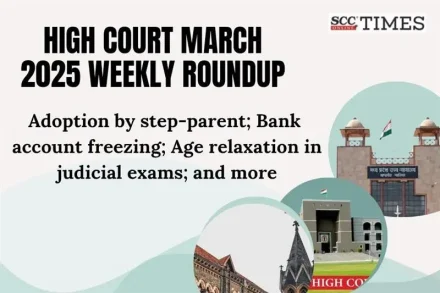
HIGH COURT MARCH 2025 WEEKLY ROUNDUP | Adoption by step-parent; Bank account freezing; Age relaxation in judicial exams; and more
A quick legal roundup to cover important stories from all High Courts this week.

A quick legal roundup to cover important stories from all High Courts this week.
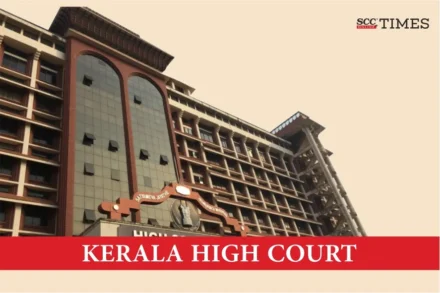
“In tribal communities, practice of child marriages remains deeply ingrained, driven by tradition, poverty, and a lack of legal oversight. Ending child marriage requires legal and social intervention”

A biological father has the inherent right to custody of his child, a right that continues until the child reaches the age of majority or until the order is modified or revoked by a competent court, and the substantive and intrinsic statutory right of a biological father to retain custody of his child cannot be waived or relaxed by the CARA under Regulation 63.

Kerala High Court said that when a question of law or a point on merit is raised by the accused in a bail application, it is the duty of the bail court to decide that point. But that decision will be a prima facie finding at the bail application stage.

On literal interpretation of Section 115(1) of Mental Healthcare Act, 2017, it can be stated that any person who attempts to commit suicide shall be presumed, unless proved otherwise, to have severe stress and cannot be tried and punished for any offences under Penal Code, 1860.

Similar restrictions are for male aged between 26 to 55. It is reasonable to presume that the legislature has imposed these age restrictions, considering the normal age that women conceive a biological child.

The Army Welfare Housing Organisation (‘AWHO’) will pay the owners of Tower B and C, who were residing as of 29-03-2024, Rs 21,000 and Rs 23,000 respectively per month towards the expenses for alternate accommodation until reconstruction.
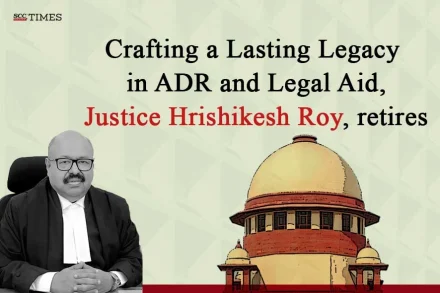
Justice Hrishikesh Roy is known for his notable contributions to the causes of alternative dispute settlement and legal aid.

“The test is whether the wife is able to maintain herself more or less in the status, in which her husband has maintained her. The wife is entitled to live the same standard of life as she lived along with the husband.”
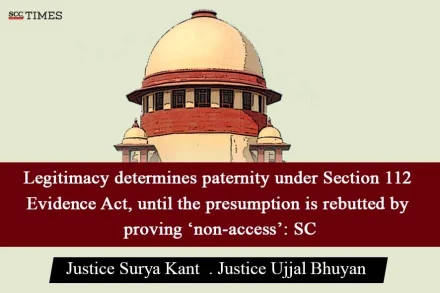
An ‘additional’ access or ‘multiple’ access does not automatically negate the access between the spouses and prove non-access thereof.

“Youngsters are prone to commit mistakes/follies during their teens or young age for which they cannot be branded as deviant and wholly unreliable.”

In the present case, since the charas and ganja seized from the accused were of small quantities, the question to be decided by the Court is whether the mushroom and magic mushroom capsules together can be considered as commercial quantity.

“Everybody should be vigilant while making comments about others, whether they are men or women.”

Kerala High Court made it clear that permission to conduct cross-examinations via video conferencing is not an automatic right. Such permission should only be granted if valid reasons are provided, and the absence of a specific provision in the rules should not prevent this.

There is a duty cast upon the Bar Council to get the certificates of the applicant verified by the Boards and Universities concerned, without charging any fees. Therefore, the notice to the extent stipulates the collection of fees of Rs.2,500/- for verification, cannot be implemented.
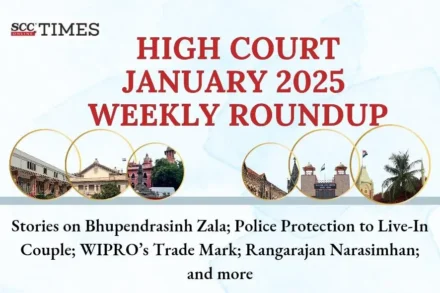
A quick legal roundup to cover important stories from all High Courts this week.
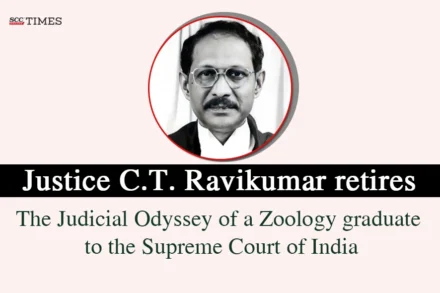
Justice C.T. Ravikumar’s journey from a young graduate in Zoology to a distinguished judge of the Supreme Court exemplifies his dedication, passion, and exceptional legal prowess and serves as an inspiration for aspiring legal professionals.

Disaster Management Act mandates the State Government to take necessary measures for disaster management, which includes both immediate relief and long-term recovery efforts.

‘Pappanji’ typically refers to a large effigy, often constructed as part of local New Year or cultural celebrations in Kerala, particularly in places like Kochi. The effigy, often representing an exaggerated figure or caricature, is burned as a symbolic gesture to mark the end of the old year and to usher in the new one.

“It merits notice that the phraseology used in Section 273B of the IT Act is such that no penalty can be imposed on an assessee under Section 271B for breach of the provisions, if he proves that there was ‘reasonable cause’ for the said failure.”